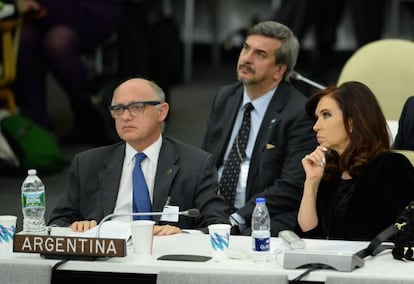Spain denies “joint action” with Argentina over British colonies
Margallo refutes accord has been reached over Gibraltar and Falklands

Foreign Minister José Manuel García-Margallo has ruled out a joint diplomatic effort with Argentina on the Gibraltar issue.
Spain's number one envoy refuted claims made last week by the Argentinean Foreign Ministry that both countries had reached an agreement on "joint actions" against London over the sovereignty of Gibraltar and the Falkland Islands.
The statement from Buenos Aires was issued on Thursday following a meeting between Margallo and his Argentinean counterpart, Héctor Timerman, at the United Nations. It wasn't until Friday that Margallo said at a news conference that there was no such agreement, calling the Argentinean statement "a bad interpretation" of what was discussed at that meeting.
Margallo and Timerman "in particular discussed the common ground regarding sovereignty disputes over the Falklands and Gibraltar," the statement said. "They agreed on joint measures to press Great Britain to comply with the mandate from the United Nations to dialogue."
The statement from Buenos Aires was issued on Thursday following a meeting between Margallo and his Argentinean counterpart
While acknowledging that he and Timerman discussed their countries' respective conflicts with the British overseas territories, Margallo said that they both agreed that continued negotiations with Britain were essential. But that doesn't mean, Margallo added, that "there was concurrence over the measures that each government will adopt to reaffirm their sovereignty claims."
Margallo explained that Spain will support a statement on the Falklands that Argentina plans to present at the next Ibero-American Summit, scheduled for October 18 and 19 in Panama. And he added he hoped Argentina would do the same at international forums in support of Spain's claims to Gibraltar.
Margallo's denial was seen as an embarrassment for the Argentinean government, but his public stance has a simple explanation: Spain and Britain are European Union partners and NATO allies who are trying to sort out their differences through dialogue, while Argentina tried to take the Falklands by military force in 1982.
Margallo has said he would seek Argentina's influence on the UN Security Council — it became a non-permanent member this year — to pressure the British government if dialogue between Madrid and London over fishing rights and environmental issues is not reinitiated through a working group.
Both Spanish and British diplomats appear to have agreed to allow EU representatives to sit down with them for the first time when talks over Gibraltar are reinstated, Europa Press reported on Sunday. Nevertheless, those talks, when they begin, will not breach the issue of sovereignty.
Spain "agrees" with Britain that it would be convenient for Brussels to "play a role" in the meetings, but Madrid is against allowing Gibraltar to have the same weight in talks as it did when the tripartite group, which was organized under the previous Socialist administration, was still active, sources told Europa Press. Those talks between Spain, Britain and Gibraltar were suspended at the end of 2010 before the current Popular Party government was voted into power.
London has said on numerous occasions that it won't enter into any discussions on sovereignty unless Gibraltarians request it. Sovereignty talks were ended in 2002.
Tu suscripción se está usando en otro dispositivo
¿Quieres añadir otro usuario a tu suscripción?
Si continúas leyendo en este dispositivo, no se podrá leer en el otro.
FlechaTu suscripción se está usando en otro dispositivo y solo puedes acceder a EL PAÍS desde un dispositivo a la vez.
Si quieres compartir tu cuenta, cambia tu suscripción a la modalidad Premium, así podrás añadir otro usuario. Cada uno accederá con su propia cuenta de email, lo que os permitirá personalizar vuestra experiencia en EL PAÍS.
¿Tienes una suscripción de empresa? Accede aquí para contratar más cuentas.
En el caso de no saber quién está usando tu cuenta, te recomendamos cambiar tu contraseña aquí.
Si decides continuar compartiendo tu cuenta, este mensaje se mostrará en tu dispositivo y en el de la otra persona que está usando tu cuenta de forma indefinida, afectando a tu experiencia de lectura. Puedes consultar aquí los términos y condiciones de la suscripción digital.








































